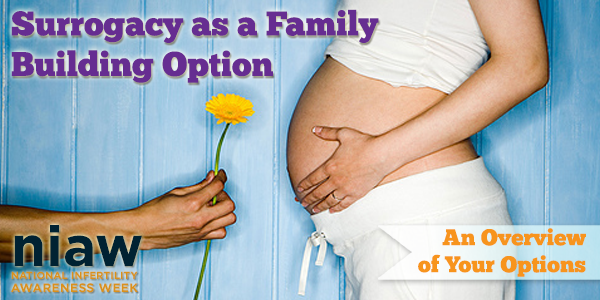Our National Infertility Awareness Week blog continues! Every day this week, we’ll feature one of our Circle of Support Sponsors as they share helpful information and advice about infertility, your options and coping. Today’s post is brought to us by Silver Sponsor The Massachusetts General Hospital Fertility Center.

photo credit: Schwangerschaft via photopin
By Abby MacDonald, LICSW
With the recent surge of surrogacy in media and in celebrity magazines, those who consider building their families through gestational surrogacy now sense some legitimacy of this pathway to have the child (or children) for whom they have yearned. However, media presentation of a complex paradigm creates a challenge. In broad form, media glosses over the practice, which minimizes or distorts the medical process and psychological adjustments a person or couple must make in building a family.
What makes gestational surrogacy a family building option for some? The American Society of Reproductive Medicine (ASRM) supports surrogacy when there is a medical contraindication for parents to biologically reproduce and a gestational womb is required for genetic parenthood (for at least one of the intended parents). It is essential to point out, however, that there are two forms of surrogacy – one of which is infrequently practiced in modern, American medicine.
We might call surrogacy the original form of assisted reproductive technology (ART). The Judeo-Christian bible is full of stories in which a woman bares a child for another. These surrogacy arrangements did not come with the technology, counseling or legal contracts from which we benefit today. In today’s terminology, we would describe these pre-ART arrangements as “traditional surrogacy”– the person who carries the pregnancy bares a genetic relationship with the baby as well. Since in “traditional surrogacy,” the surrogate is carrying her own biological child, the courts have examined the legality of a person “signing away her rights” prior to pregnancy (see the case of Baby M). “Traditional surrogacy,” is a very uncommon option due to the psychosocial and legal complexities involved. That being said, it is important to differentiate this type of controversial surrogacy to what is now commonly practiced, which is called “gestational surrogacy.”
Gestational surrogacy is one where the child has some genetic tie to the parents who will raise him or her, but the gestation occurred in another woman’s body. While the child has at least one point of genetic connection to the parents who will raise him or her, a sperm or egg donor may be used as well. This is accomplished through the stimulation of the intended mother (or donor’s) ovaries; at the same time the gestational carrier’s uterine lining is developed. When the time is right, an embryo is created (though the fertilization of the egg with the partner or donor’s sperm) and transferred to the gestational carrier.
We say it takes a village to raise a child, and in this case, it takes a village to create one. Prior to pregnancy even occurring, the gestational carrier, her partner (if she has one) and the intended parents undergo extensive medical testing, psychological consultation, assessment and screening, and have consulted with reproductive attorneys, surrogacy agencies, insurance companies, and many hours of asking themselves, “Is this the right path for me?”
As someone who is regularly involved with the counseling of intended parents and gestational carriers, I am often amazed at the resilience and fortitude of all involved, and the mutual wonderment of each other’s roles in this unique formation of a family.
The logistics of managing a family-building process beyond the members of the family has to be examined. We frequently visit the natural tension that is created when a process that may have once been considered intrafamilial (parent-child) becomes interfamilial (parent-child-gestational carrier and her family), and decisions that get made have to consider the health, safety and well-being of a third party.
The counseling that I offer couples who choose surrogacy as their family building option requires a careful examination of how their infertility has impacted them emotionally. For many, we attend to the feelings of loss related to not having the experience of the intended mother carrying their baby. For others, it may be a question of better understanding the experience of a carrier, and the needs and boundaries that are helpful to be mindful of in these arrangements. The common thread for most patients I see is worry about the process, pregnancy and parenting beyond surrogacy. This is best approached with open-hearted awareness of one’s feelings. Families deserve thoughtful support from clinicians and organizations familiar with the dynamics of families created through gestational surrogacy in order to prepare for the journey ahead and support feelings that emerge throughout the process.
About the Author
Abby MacDonald, LICSW is the clinical social worker for the Massachusetts General Hospital Fertility Center. In this role, she offers counseling, education and consultation to individuals and couples who need support related to their family building journey. In addition to her role at MGH, Abby has a private practice treating individuals and couples in Cambridge, MA.
Still have questions about pursuing the donor conception option? Register for RNE’s Surrogacy Connect & Learn full-day seminar on May 4th! Financial assistance is still available to attend.


The best precious gift in this world is to be parents. Spreading happiness through surrogacy is a good thought.